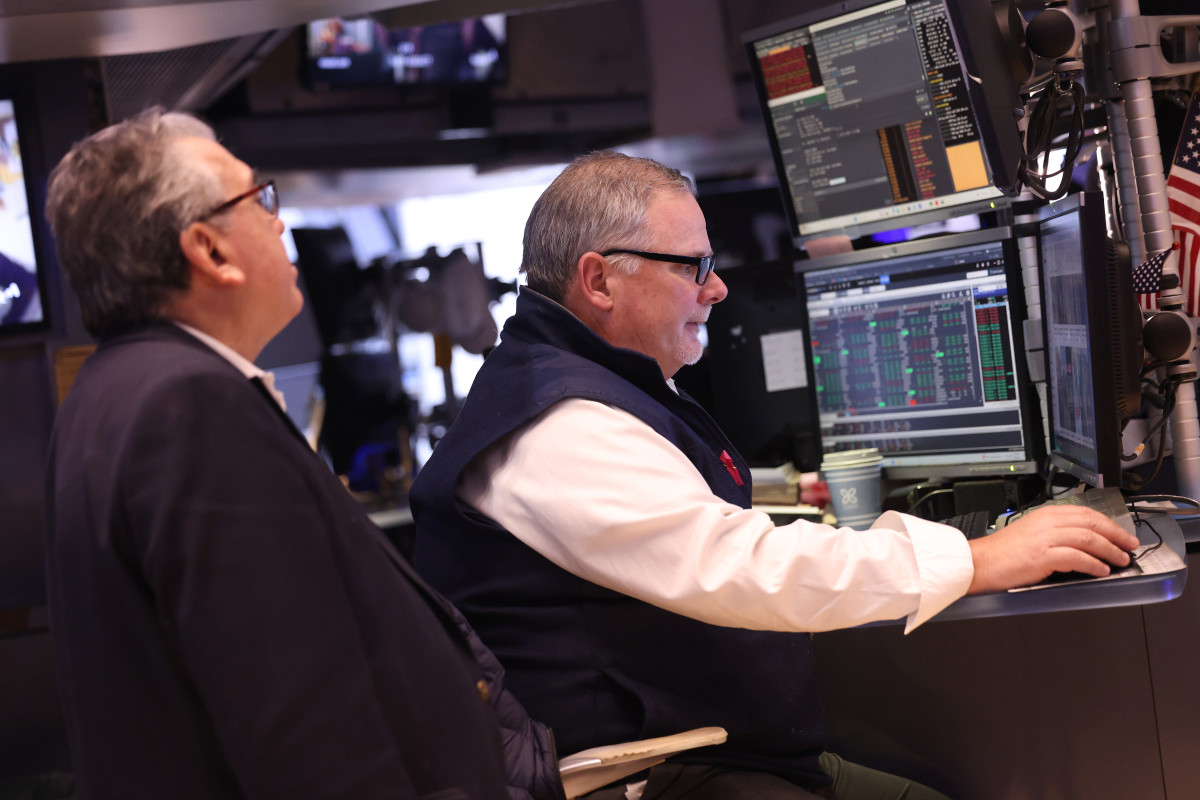
Stocks ended higher Friday as Wall Street reacted to earnings reports from some of the nation's biggest banks.
The Dow Jones Industrial Average gained 247.15, or 0.62%, to finished the session at 40,000.90.
The Dow hit a fresh all-time high of 40,257.24 during the session, CNBC reported, the first time above 40,000 since topping that milestone in late May. The S&P 500 rose 0.55% to 5,615.35, while the tech-heavy Nasdaq advanced 0.63% to 18,398.45.
The Russell 2000 gained +1.09% to 2,148.27 and Quincy Krosby, chief global strategist for LPL Financial, said the small-cap stock index “is viewed as an important barometer of for potential interest rate easing, but also a gauge a gauge for economic conditions.”
"Typically, the small/mid cap universe will sell off with the slightest suggestion of a material economic slowdown, despite their attractive valuations," he said. "Historically, the Russell 2000 lags the market for three months following the first rate cut as the Fed normally cuts rates due to concerns about the economy and specifically the labor market."
Krosby said that Federal Reserve Chair Jerome Powell has made it clear that the Fed would cut rates at a faster pace to help support the economy.
"In this scenario the Fed wouldn’t wait until its September 18 meeting, rather an easing cycle would be initiated sooner if required by deteriorating labor conditions," he said. "The market would much prefer a rate cut predicated on inflation easing amid a solid economic landscape."
Update 3:48 p.m. EDT
Key companies reporting earnings next week
The earnings season kicked off today with big banks, and it will slowly ramp up over the coming weeks. Next week, we’ll have several high-profile companies reporting that are worth tracking:
Monday: Goldman Sachs (GS) will continue the wave of bank earnings when they report their latest figures.
In the last 30 days, analysts have reduced their EPS estimates from $8.83 to $8.34, and their average price target is $469, below the current price of shares, which is near $481.
Overall, Goldman Sachs is expected to report revenue of $12.46 billion for the quarter.
Tuesday: Bank of America (BAC) analysts' average price target is $41.72, almost exactly where shares traded on Friday. Wall Street expects it to deliver revenue of $25.22 billion and earnings per share of $0.80.
UnitedHealth (UNH) , the nation’s largest health insurer, also reports on July 16. It has beaten earnings estimates in each of the past four quarters, and analysts are optimistic the trend will continue this quarter.
Of 22 analysts polled, all rate UnitedHealth as a “Strong Buy” or “Buy.” Analysts average stock price target is $576, up from $513 currently. Overall, UnitedHealth is expected to report revenue of $98.83 billion and earnings of $6.66 per share for the quarter.
Wednesday: After a sluggish start to this year, Johnson & Johnson (JNJ) hopes to regain investor confidence when it releases its earnings on July 17.
Analysts' EPS estimates have increased from $2.51 to $2.70 in the last seven days. Revenue is expected to be $22.29 billion.
Thursday: Taiwan Semiconductor Manufacturing (TSM) is looking to show it’s sustaining its recent AI-fueled growth when it provides its quarterly update.
However, analysts have largely downgraded TSM to “Hold” from an overwhelming “Buy” rating in May and June. Analysts’ average price target is currently $181.30, below the roughly $190 price at which shares changed hands on Friday. Estimates are for sales and earnings per share of $20.06 billion and $1.39, respectively.
Netflix (NFLX) is also set to report its earnings on July 18. Analysts’ EPS forecast has jumped from $4.4 to $4.74 in the last seven days. Revenue is expected to be $9.53 billion as it continues to profit from a crackdown on password sharing.
Friday: American Express analysts estimate sales and earnings per share of $16.59 billion and $3.23 for the quarter. Investors will likely focus on credit card delinquencies and defaults to see if trends are improving or worsening.
Update 2:15 p.m. EDT
Bad is good?
Investors are whistling past poor consumer sentiment data earlier today. With a little under two hours left in the trading day, the S&P 500, NASDAQ 100, and Russell 2000 are all up over 1%.
The University of Michigan consumer sentiment index, an economic indicator that tracks how optimistic consumers feel about their finances and the state of the economy, unexpectedly dropped to 66 from 68.2, an eight-month low.
Consumers’ expectations for inflation over the next year fell for a second month to 2.9%. The current conditions gauge fell to 64.1 from 65.9, its lowest since December 2022.
A measure of expectations also declined to 67.2 from 69.6 in June, demonstrating a lack of consumer confidence in the current economy. Buying conditions for durable goods dropped to 85, the lowest level in just over a year.
The downbeat results may help fuel rate cuts as soon as September.
The CME FedWatch tool projects a 93% chance that the Fed will reduce its Fed Funds Rate by 0.25% in September.
Related: CPI inflation report fuels Fed interest rate cut bets
Update 1:40 p.m. EDT
Small-cap stocks surge to new highs
Stocks are holding onto solid gains, led by a surge in the Russell 2000 small-cap stock index. The iShares Russell 2000 ETF IWM is up 1.4% today, bringing its weekly return to 6.4%. That's considerably better than the S&P 500, up 1.18% today and 1.5% this week.
Lately, a big complaint about stocks has been a lack of participation. Fewer advancing stocks than declining stocks, or breadth, has arguably been a headwind. That appears to be changing, though, given the Russell's move higher.
On Thursday, July 11, 2,433 NYSE stocks advanced, and just 405 declined. Meanwhile, 279 stocks notched new highs versus just 9 stocks making new lows.
The rally in the Russell 2000 lifts it to its highest levels since January 2022.

Update 11:12 a.m. EDT
Huge hack hits AT&T subscribers
Cybersecurity is still critical as hackers get increasingly sophisticated, using next-generation technology like artificial intelligence to crack through firewalls and break down defenses.
The latest to be hit is AT&T, which suffered a massive data breach. Nearly all of its customers in 2022 had information stolen.
Read more: Latest AT&T data breach affects 'nearly all' customers
The FT Nasdaq Cybersecurity ETF is up 1.3% today, and only 2.5% below all-time highs. AT&T stock is down about 0.5%.

Update 10:51 a.m. EDT
Warning sign?
Yesterday’s 3% CPI inflation data for June sparked optimism that inflation would trend lower, giving the Fed room to cut.
However, the June producer price index was 2.6%, above the 2.3% estimates, and the core PPI of 3% was above the 2.5% estimates (and the highest since April 2023).
Higher producer inflation can trickle into higher retail inflation as companies recoup cost increases to protect margins.
PPI makes sense to me and so does CPI. Remember, one is consumers, and they appear to be cutting back, but it’s still costs producers more to make.
— Angie G (@MomAngtrades) July 12, 2024
Update 10:17 a.m. EDT
Stocks edged higher Friday as second-quarter earnings season kicks off with reports from the major banks and as investors parsed a follow-up on the inflation outlook from the wholesale price index for June.
The Dow Jones Industrial Average gained 128.52 points, or 0.32%, to 39,882.27, while the S&P 500 rose 0.60% to 5,617.77 and the Nasdaq advanced 0.78% to 18,426.23.
Producer prices rose about a quarter percentage point more than expected in June after factoring in upward revisions to prior months.
“The big picture is that inflation pressures have moderated over the last two years but are still a bit stronger than the Fed would like them to be,” said Bill Adams, Chief Economist for Comerica Bank.
“With the economy operating in low gear, the Fed thinks the right time to start cutting interest rates is close,” he added. “But they are planning to cut gradually, slower than in the last couple of interest rate cycles, to ensure that inflation stays on a downward trajectory.”
Update 9:25 a.m. EDT
Wholesale prices measured by the government's Producer Price Index rose 0.2% in June, which reports say was above the analyst consensus estimate of 0.1%. The core PPI, which excludes the volatile pricing of foods, energy, and trade services, was unchanged from May.
The U.S. Bureau of Labor Statistics reported that the index rose 2.6% in the year ended in June, the largest rise since it rose 2.7% in the year ended in March 2023.
On the corporate front, AT&T (T) was hit with a hack of customer data, including records of calls and texts for nearly all its mobile-phone users, for a six-month period in 2022, one of the biggest breaches of private communications data in recent memory, Bloomberg reported. This hack was separate from one reported earlier this year, the news service reported.
Boeing (BA) received an order for 35 of its 737 Max aircraft, including its largest variant, the Max 10, from the U.S. aircraft leasing unit of Tokyo Century.
Meanwhile, Boeing told some 737 Max customers in recent weeks that aircraft due for delivery in 2025 and 2026 might face additional delays of three to six months, Bloomberg News reported on Thursday, citing people familiar with the matter.
At last check futures for the Dow industrials indicated a 91-point rise, while those for the S&P 500 and Nasdaq Composite were up 7 and 6 points respectively.
Stock Market Today:
Futures linked to the Dow Jones Industrial Average were up 77 points, or 0.19%, to 40,166, while S&P 500 futures inched up 0.10% to 5,645.25 and futures tied to the tech-heavy Nasdaq was flat at 20,441.
Stocks ended lower Thursday, snapping the longest winning streak for the S&P 500 in three months. The market moves followed the Commerce Department's report that the headline Consumer Price Index for the month of June was pegged at an annual rate of 3%, down from the 3.3% pace recorded in May and just inside Wall Street forecasts of a 3.1% reading.
The June reading matched the lowest level since March 2021, although the headline print was also 3% in June of last year.
On a monthly basis, price pressures fell 0.1% from May, in one of the largest declines in more than three years, thanks in part to a 4% decline in gasoline prices.
Bank earnings reports
In a Friday morning note Bloomberg reported that the "shares of the biggest Wall Street lenders are trouncing the broader market this year, with investors expecting bank earnings outlooks to brighten in the coming quarters.
"While net interest income — a key source of revenue for lenders — is expected to drop, investors are focusing on what’s likely to be a rosy view on fee-generating businesses like investment banking."
Among Friday earnings reports, Wells Fargo (WFC) reported second-quarter net income per share rose to $1.33 from $1.25 in the year earlier quarter. A survey of analysts from Yahoo Finance was looking for $1.29 in the latest quarter.
In a statement Chief Executive Charlie Scharf said that fee-based revenue grew, "offsetting an expected decline in net interest income," the difference between what a bank takes in on loans and pays out on deposits. Net interest income fell 9% in the quarter.
JPMorgan Chase (JPM) , the nation's biggest bank by assets, reported net income of $6.12 a share against $4.75 a share in the year-earlier quarter. The latest earnings reflected a $2.04-a-share gain tied to an exchange offer of its Visa common shares. Overall, adjusted net income in Q2 2024 was $4.40 a share. Net interest income rose 4%.
In a statement, Chief Executive Jamie Dimon reiterated a number of risks that the bank sees going forward, including a "dangerous" geopolitical situation.
And despite the Federal Reserve's progress to reduce inflation, he sees "multiple inflationary forces in front of us: large fiscal deficits, infrastructure needs, restructuring of trade, and remilitarization of the world. Therefore inflation and interest rates may stay higher than the market expects."
Citigroup reported that second quarter net income reached $1.52 a share from $1.33 in the earlier quarter. Analysts surveyed by LSEG were expecting profit of $1.39, CNBC reported.
On Wednesday Citigroup was fined $136 million by US Bank regulators regarding violations tied to data quality management and risk controls.
The bank will pay $61 million to the Federal Reserve and $75 million to the Comptroller of the Currency.
Bloomberg reported that Citi didn't admit or deny the allegations but said it was taking steps to correct the violations.
Related: Veteran fund manager sees world of pain coming for stocks







